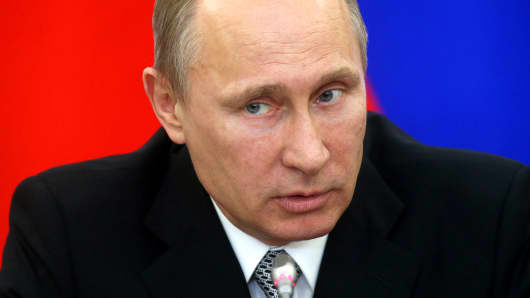Ukraine's life support, Russia's economic angst
In Washington, hawks demand tougher economic sanctions, which would sharply reduce Russia's oil and gas exports and revenues, decimate foreign investment and severely destabilize Russian growth. They would also like to boost U.S. and NATO forces near Polish borders, Baltic republics and northeast Romania — dramatically.
President Obama's recent $1 billion "European reassurance initiative," which was designed to reaffirm U.S. commitment to security and democracy in Eastern Europe, is the first step to this direction. But it is not exactly a show of force. It represents barely 0.15 percent of U.S. military spending in 2013.
Read MoreHow collapse of Iraq would affect the U.S.
Nevertheless, a truly severe sanctions scenario would escalate the current regional stalemate into a large-scale crisis with global implications. It would significantly weaken U.S. pivot to Asia. It could also prove another U.S. confrontation without exit strategy, as Henry Kissinger has warned.
Ukraine is already on lifeline support. In 2014 alone, Kiev's sovereign financing needs will soar to $36 billion, which exceeds its total reserves by 2.4 times. Since the country would have defaulted without support, IMF created an $18 billion rescue package, while the EU has unveiled a $15.5 billion aid plan for Ukraine.
The West has made a huge bet on Ukraine's political stability, despite massive uncertainty and corruption.
What about Russia? In 2012, Russian GDP growth was still 3.4 percent, but it more than halved to 1.3 percent last year. In May, Putin's approval rating still soared to 83 percent, a six-year high. But the real question is how long Putin can sustain his strong domestic support amid a severe sanctions scenario.
Moscow's impending contraction would penalize growth by 0.8 percent, while capital outflows could climb to more than $100 billion. If inflation will exceed 8 percent in 2014, new rate hikes will deepen economic pain.
Impact on U.S. and Europe
The U.S. is not immune to a severe sanctions scenario. It would penalize the current optimistic consensus, which expects growth to accelerate to 2.8 percent in 2014 and 3 percent in 2015. But factor in a full-sanction scenario before the mid-term elections in fall 2014 and presidential elections in 2016 and all bets are off.
Europe can endure a short-term energy crisis, but if the crisis will prove longer, the region would suffer still another contraction. In particular, those economies that get 80 percent to 100 percent of their gas from Russia would be more exposed (Finland, Ukraine, Slovakia, Poland, and Hungary).
Moreover, in the post-election Europe, the right-wing protest seeks independence domestically, distance from the U.S., and rapprochement with Russia.
In France, Marine Le Pen would like to pull France out of NATO. Like Charles de Gaulle, she seeks independence from the U.S. Like her counterparts, she believes that old U.S.-led institutions such as the World Trade Organization, World Bank and International Monetary Fund have "expired."
Le Pen advocates a privileged partnership with Russia, which is necessitated by "obvious civilization and geostrategic factors" and "energy security interests." She supports cooperation with Russia within a "Eurasian alliance."
These ideas have unleashed great behind-the-facade concern in Washington, which had hoped to complete the EU-U.S. free-trade agreement (FTA) without further headaches.
What's worse, severe sanctions scenario could push the new and fractious Brussels and its euroskeptics even closer to Putin and further from the White House.
Fatal temptation
The absence of strategic trust between Washington and Moscow reflects more than a decade of erosion in bilateral ties.
Before the elections of 2014 and 2016, the severe-sanctions scenario is a tempting option to the critics of the White House, possibly even to President Obama. But as they say, beware what you wish for.
As senior policy makers like to say, sanctions are what you do when you don't know what do. Russia's recent actions could prove a textbook case.
Commentary by Dan Steinbock, a research director of International Business at India China and America Institute (USA), visiting fellow at Shanghai Institutes for International Studies (China) and in the EU-Center (Singapore). See also www.differencegroup.net.


